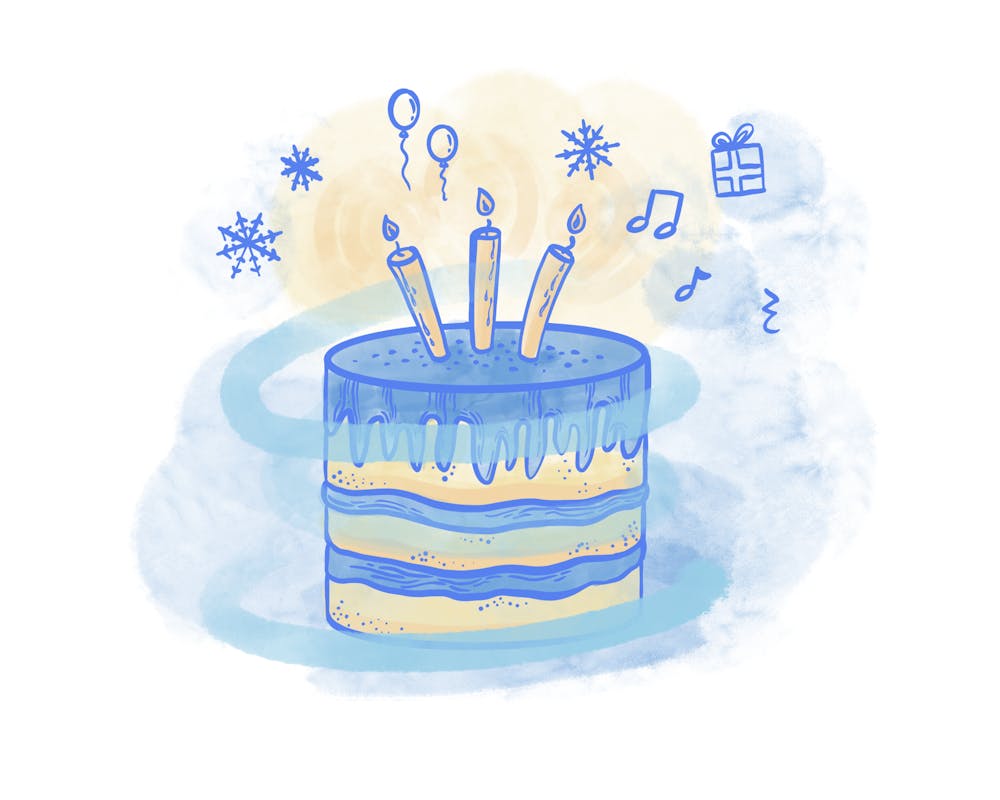“Get rid of death. Celebrate increase. Make it be spring.”
- “February” by Margaret Atwood
Every late February, during that final cold stretch of winter when all creatures yearn for the green hues of March, my birthday comes to pay a visit. I tend to be sitting at the window, awaiting springtime with mild impatience. I listen for the whistle of birdsong, search for the soft green buds on the trees, eye the bars on my windows in hopes that a squirrel will scamper past. But my birthday, when the groundhog feels like a cruel memory and all the red roses from the month’s great holiday have withered, must first make her pilgrimage to my doorstep. She comes bearing nothing but reminders of all that has passed and shows up shivering, ill-equipped for the late winter cold. As she knocks, I peer through the peephole hoping that maybe, if I remain silent long enough, she’ll walk away, cancel her visit for the year.
She wasn't always an unwelcome visitor. I once excitedly awaited her arrival, celebrating her return, year after year. I loved how her presence would give me the power to choose what my family would eat, who to invite to my sleepover a week later, and what activity we would do that time around. After an afternoon at the movies or painting pottery or wandering around the mall, my friends and I would set up beds around my room and stay up whispering in the dark about the drama at school and all the boys we had crushes on. The next morning, we would wake up and make waffles smothered in syrup and powdered sugar in the kitchen, the weekend sunlight shining through the windows.
But as I grew older, the yearly visit from my birthday became less of a novelty. The combination of a string of not-so-great birthdays in middle school, my growing dislike of attention in high school, and the overall exhaustion of worrying about everyone else's needs all led to my hesitation surrounding my birthday’s yearly trip. While I didn’t avoid the celebration altogether, I scaled down, preferred festivities without all the fanfare.
Going into college, the apathy about Late February’s arrival grew, except this time it became replaced with mild dread. The dreariness of my first Providence winter combined with the loneliness of being a first-year made me terrified for the day that was meant to be joyful and perfect. I had no idea how to welcome my birthday into my new home, how to prepare for the arrival that everyone seemed to assume I eagerly expected. Where could I possibly find room for her to sleep in my forced triple? What would I feed her? How would I entertain her for the day?
It turned out okay in the end. I got to play in the snow with wonderful people and I took a walk to a bookstore and I shared cookies with the people on my floor. Yet the next year, as February rolled around once more, the anxiety over my birthday began to grow once again. I fretted about what to do. Why, I asked, would a day that sounds so good in theory make me feel so unenthusiastic?
Late February 2016. For the first time, my birthday brought with her a harsh lesson of loss. On the day that I celebrated 13 years of my life, I learned that my father had to fly out that night to visit my dying grandfather halfway across the world. When my sister and I got home from school, my mother rushed us to take a family photo in front of our house as I hoisted up a brightly colored celebratory lawn sign. My shirt said “Happy.” I was anything but.
Four days later, I remarked on how great it was that Grandad made it through his 86th birthday in Northern Ireland.
Less than an hour later, we received a text that he had died.
I am not here to say that my grandfather’s death ruined my birthday. I still continued to celebrate every year with cake and candles and streamers and song. But every time the visit from my birthday rolls around again, I remember the truth of life, of the heartbreak that can occur on a day that’s meant to be perfect. Even a celebration of life cannot stop death.
Various reasons are cited for the “birthday blues.” One explanation is that there’s a societal expectation that birthdays have to be perfect, or at least, as psychologist Ash King writes, a “pressure to feel happy and joyful on this day that is routinely dedicated to celebrations.” And I think that’s a part of it for me. I’ve always had this image of my birthday as this perfect day, one where everything magically goes right, everyone is happy, you do all the things you love, and all your wishes magically come true. And maybe as a child, it feels that way. You get to wear your new blue dress and eat your favorite chocolate cake and your friends give you necklaces and coloring books and stuffed animals to cover your bed. It feels perfect because you can’t see all of life’s problems behind the festivities. Everything gets lost in the haze of sugar and materialism.
But as you get older and learn more about the world, you begin to realize that nothing is perfect. No day is sacred, isolated from pain. Sometimes the moments are smaller, like being stuck on a plane for the entire day. But as a kid, the flight attendants still bring you ice cream and the Muppet movie wins at the Oscars, so it’s all okay, in the end. But sometimes the imperfections are so large that you never can forget them. Sometimes they leave a stain, perpetually muddying the day. I learned that lesson the hard way when I turned 13, and I continued to learn it, over and over again.
Birthdays as we know them are a relatively recent phenomenon. Joe Pinsker writes that until the Industrial Revolution, the only people whose birthdays were celebrated were high-profile figures—kings and presidents and the like. But with industrialization creating more effective ways to measure time came also a heightened awareness of the personal passage of time. Out of this awareness came the makings of the modern birthday celebration.
Part of my problem is similar to that of the early anti-birthday crowd, whom Pinsker notes “thought that the celebrations were self-centered and materialistic.” I’m scared of attention, and I feel guilty asking people for their time on a normal day. Why shouldn’t I just treat the day like any other? Why should others put down their lives to celebrate an event that I played no part in making happen?
Yet my argument falls apart at the edges. I have no problem with anyone else’s birthday. I love planning events that others will love and hanging balloons and writing cards where I lavish my gratitude for their life on them. I love to celebrate others.
So why do I feel unworthy of celebrating myself?
This year, as the anxiety over the arrival of Late February drew near, I told my friend over our lunch of dining hall falafel and bagels that I had no idea what to do. I felt like I had to celebrate the day, but I also hated all the baggage that comes with it, the navigation of social dynamics and schedules, and the general lack of enthusiasm I feel about the day. I told her about the history of it all, the death of my grandfather when I turned 13, and the crippling loneliness of my freshman winter.
“This is the year we reclaim your birthday,” she said.
Then we went back to our homework and chewy bagels and mildly wilted lettuce.
And so my birthday came knocking this year, just as it always does. I reluctantly opened the door to her, and she took off her shoes before coming in this time, sat patiently on the floor of my room in the slants of afternoon sunshine. I spent time with my friends and volunteered in the church nursery, cooking make-believe cakes and soups with the toddlers. I ate good food and walked in the winter air and skipped backward up uneven cobblestone stretches of College Hill. My cake got stolen out of the communal fridge and the thief was never uncovered, but it didn't phase me. No day is perfect. Expecting one to be just sets us up for disappointment.
So yes, my birthday is just another day out of three hundred and sixty-five of them. But it’s also a day to celebrate myself, my growth and my accomplishments, and the fact that I made it through another year. I deserve to be celebrated. I deserve to feel loved and seen and appreciated, however unworthy I may feel at times. It’s not selfish.
So next year, maybe I’ll welcome Late February with open arms. Even though she blows in a draft sometimes, she also serves as a reminder that there is life, even in the darkest days.





